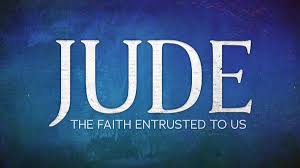Al – Like Sodom and Gomorrah, They Commit Sexual Immorality Jude 7, 2 Peter 2:6
Like Sodom and Gomorrah, They Give Themselves
Up to Sexual Immorality and Strange Flesh
Jude 7 and Second Peter 2:6
Like Sodom and Gomorrah, they give themselves up to sexual immorality and strange flesh DIG: Who were those Sodomites like according to Jude? What is the point of the comparison? How does this example from history relate to the problems of unbelief, immorality, violence and rebellion? How does this example convey the certainty, severity and rightness of the Lord’s judgment?
REFLECT: How are believers supposed to react to homosexuality? Avoidance? Judgment? Love?How does Yeshua see the homosexual? Do you think you can hate the sin, but love the sinner and still keep God’s high standard? How? Why? Why not?

Like [the men of] Sodom and Gomorrah and the cities around them, they gave themselves up to sexual immorality and went after strange flesh. They serve as an example of those suffering the punishment of eternal fire (Jude 7 NIV and NKJ).
And He condemned the cities of Sodom and Gomorrah, reducing them to ashes and ruin, as a warning to those in the future who would live ungodly lives (2 Peter 2:6).
By means of the fourth triad, Jude next reminds believers of three lessons from history. For the third lesson, he brings to remembrance the example of Sodom and Gomorrah. This incident in history has made a profound impression on the Jewish people. Sodom and Gomorrah are used time and again in the Scriptures as the supreme example of the judgment of sin by ADONAI. They are even used by Yeshua Himself. The glare of Sodom and Gomorrah is flung down the whole length of the Bible (Deut 29:23, 32:32; Isaiah 1:9, 3:9, 13:19; Jeremiah 23:14, 49:18, 50:40; Ezeki’el 16:46, 49, 53, 55; Lam 4:6; Amos 4:11; Zephaniah 2:9; Matthew 10:15, 11:24; Luke 10:12, 17:29; Romans 9:29; Second Peter 2:6; Jude 7; Revelation 11:8). Sodom and Gomorrah was only a day’s journey from Jerusalem, and this divine judgment on sin was never forgotten.47
Like the angels of Genesis 6 (Jude 7a). This verse begins with hos, an adverb of comparison, meaning in a similar way, in the same manner as, just as or like. Here it introduces a comparison showing the similarity of the angels of Jude 6 and [the men] of Sodom and Gomorrah.
[The men of] Sodom and Gomorrah (see my commentary on Genesis, to see link click Ey – Two Angels Arrived at Sodom in the Evening) gave themselves up to sexual immorality and went after strange flesh (Jude 7b KJV). However, the likeness between them lies deeper than the fact that both were guilty of committing sin. It extends to the fact that they committed the same identical sin. They both went after strange flesh. The word strange in the Greek is heteros, meaning another of a different kind. [The men of] Sodom and Gomorrah and the angels had sex that was unnatural because it went contrary to nature, or outside what was proper for them. For the Sodomites the strange flesh was other men, or homosexuality. In the case of the angels of Genesis 6, the strange flesh was sex with human women. This was flesh of a different kind. There are two Greek words for this. One word means another of a different kind, and the second word means another of the same kind. The one used here for strange is another of a different kind. Those men and those angels had gone after flesh of a different kind. Both were not merely guilty of sexual sins, they were both guilty of unnatural sexual sins.48
Those apostates who claim that homosexuality is “normal” won’t tell you that until the nineteenth century there is no evidence of anyone being exclusively homosexual because it was unnatural. It was not less unnatural for the Israelites to rebel against ADONAI who had redeemed them. Jude uses the unnaturalness of the rebellion against God to urge his readers not to follow in the footsteps of the false teachers. Sin and the rejection of the commands of the LORD are violations of His divine order of things. It must be punished.49
And He condemned the cities of Sodom and Gomorrah, reducing them to ashes and ruin. They serve as a warning to those in the future who would live ungodly lives (Second Peter 2:6 and Jude 7c). Just as the incarceration of the fallen angels served as an example of the LORD’s judgment of sin, so the cities of Sodom and Gomorrah served as a warning. There are curious parallels between our contemporary scene and Sodom, for that city was well known for its immorality – and, of course, like most people today, they thought they had outgrown the idea of God, only to discover their mistake when it was too late. The punishment of burning sulfur on the Sodomites of Sodom and Gomorrah illustrates the eternal fire of hell, which will be experienced by the apostate teachers.
And suffering the punishment of eternal fire (Jude 7d). They, too, are now suffering the punishment of eternal fire. Suffering is hupecho, meaning to hold under, to put under, metaphorically, to sustain, and to undergo. The participle is present, showing that they are suffering to this very day the punishment that came upon them in Lot’s time. The rich man and Lazarus (Luke 16:22-24) is another example of the lost that are now in conscious suffering, awaiting the final suffering of eternal fire and suffering in hell.
Jude used this example of apostate Gentiles, as well as the examples of the apostate Israelites and apostate angels, to remind those who deny God’s truth and ignore His warnings. For His righteous judgment upon sin, unbelief and apostasy is always the same. His treatment of the ungodly in the past does not differ from His treatment of the wicked now. In the final reckoning, centuries of rebels will stand before Jesus Christ because the Father judges no one, but has entrusted all judgment to the Son (John 5:22). At that time they will receive their final, eternal sentence (see my commentary on Revelation Fo – The Great White Throne Judgment).
Genesis 19 is by no means the only text in the TaNaKh that condemns homosexuality. It is clearly prohibited in ADONAI’s commandments to the Israelites. The LORD said through His prophet Moses: Do not lie with a man as one lies with a woman, that is detestable (Leviticus 18:22), and: If a man lies with a man as one lies with a woman, both of them have done what is detestable. They must be put to death, their blood will be on their own heads (Leviticus 20:13). How much more explicit can you get?
God’s Word is crystal clear and extremely strong in the condemnation of homosexual acts. Reminiscent of the wicked Sodomites in the time of Lot (Genesis 19:1-11), an old man told the Levite, “You are welcome in my house, only don’t spend the night in the square” (Judges 19:20). But it was no use, the wicked men of Gibeah surrounded the house and demanded that the old man send out the Levite to satisfy their homosexual desires. Pounding on the door, they shouted to the old man who owned the house, “Bring out the man who came to your house so we can have sex with him” (Judges 19:22b). This verse is identical in grammatical structure as Genesis 19:5. God views those who engage in homosexual acts as being wicked (see the commentary on Leviticus Ae – The Bible and Homosexual Practice).
During the later stages of the intertestamental period, Jews frequently came into contact with the Greek world, rife with homosexual relationships, even though they were not exclusive. Confrontation with this worldview led Jews to stand up for more strongly the biblical ban on homosexuality. In fact, resistance to homosexuality remains the consistent and distinctive feature of Judaism.
But in contrast to the Jewish resistance to homosexuality, the world has recently seen the outbreak of many ancient sins and perversions. The foremost of them being homosexuality. Actually, tolerance for homosexuality has become accepted in an astonishingly short period of time. Attitudes have changed so rapidly that what would have been totally unacceptable in the past – homosexual teachers, gay and lesbian clubs on high school campuses, homosexual promotions at theme parks and sporting events, legal gay and lesbian marriages, and homosexual churches – are now accepted without question by the general public.
Believers, of course, are not immune to these changes. They affect our co-workers, our friends, our families, and in some cases our own children. Satan is still alive and at work in the world (First Peter 5:8). But the Word of God is meant to change people, not for people to distort the Word of God. For all Scripture is God-breathed and is useful for teaching, rebuking, correcting and training in righteousness (Second Timothy 3:16). To apply Jude 7 to our lives, we first need to see what other New Covenant passages have to say about homosexuality. There are three such passages that condemn that lifestyle.
This is why God has given them up to degrading passions; so that their women exchanged natural sexual relations for the unnatural (so much for the “born that way” argument). And likewise the men, giving up natural relations with the opposite sex, burn with passion for one another, men committing shameful acts with other men and receiving in their own persons the penalty appropriate for their perversion (Romans 1:27 CJB). The context here is the wrath of God.
There is no recorded use of the Greek word for homosexuals anywhere in the ancient world prior to its appearance in First Corinthians around 55 AD. So Rabbi Sha’ul had to make up a word for it because one didn’t exit. He took two Greek words from Leviticus 18:22 in the Septuagint; arseno or males and koitai or bed, (implying males who share the same bed) to make the word arsenokoitai or homosexuals. Do you not know that the wicked will not inherit the kingdom of God? Do not be deceived: Neither the sexually immoral nor idolaters nor adulterers, nor male prostitutes nor homosexual (arsenokoitai) offenders, nor thieves nor the greedy nor drunkards nor slanderers will inherit the kingdom of God (First Corinthians 6:9-10).
We are aware that the Torah is not for a person who is righteous, but for those who are heedless of Torah and rebellious, ungodly and sinful, wicked and worldly, for people who kill their fathers and mothers, for murderers, the sexually immoral – both heterosexual and homosexual (arsenokoitai) – slave traders, liars, perjurers, and anyone who acts contrary to the sound teaching (First Timothy 1:9-10 CJB).
The bottom line is that we can expect inspired B’rit Chadashah writers to agree with inspired writers of the TaNaKh except when they explicitly indicate otherwise. The TaNaKh is clear about the nature of homosexuality: It is a sin. Nowhere does the New Covenant disagree; in fact, it validates the TaNaKh. When we add to this that Jewish teaching was unanimous in condemning homosexuality, trying to justify it is wishful thinking at best and dishonest at worst. It just doesn’t fly.
The fact that there are so few verses does not prove that homosexuality was no big deal to the human writers of the New Covenant. It simply means that they assumed the view that was prevalent in the Jewish culture. Sha’ul saw homosexuality so contradictory to ADONAI’s creative purpose that is was not worth dwelling on after stating the obvious. It seems that this matter is another instance of people trying to read current social customs into the Bible rather than letting the Bible determine those mores. After all: Yeshua Messiah is the same yesterday, today and forever (Hebrews 13:8 CJB).
But people caught in the sin of homosexuality usually seek to rationalize or justify their own conduct. They pollute their own bodies and do not consider it a sin (Jude 8). So attempts to make the Bible condone their behavior should not surprise us. The big push today is to make homosexuality “normal.” But they turn the grace of God into an excuse for blatant immorality (Jude 4). In my entire life, I have never known a homosexual that was not in turmoil. Wisdom will save you from the ways of wicked men, from men whose words are perverse, who have left the straight paths to walk in dark ways, who delight in doing wrong and rejoice in the perverseness of evil (Proverbs 2:12-14).
Thus, believers committed to the authority of the Scriptures must apply the teaching of the Bible on this matter. We must resolutely refuse to allow the culture to shift our values or to compromise our application of them. Homosexual behavior is sinful; in fact, it is a form of behavior that can exclude people from the Kingdom of God (First Cor 6:9-10). As stewards of the Good News, we are entrusted with this message.
But we must proclaim this message in the right spirit. We need to speak out, but we need to speak because we are concerned to defend scriptural values and also because we love those who are homosexual. The loving thing to do is not to simply keep quiet, mind our own business, and let homosexuals pursue their chosen lifestyle right to the gates of hell. The loving thing to do is to reach out with the gospel to homosexuals. Only the power of the Spirit can break through the lies that Satan has convinced them of.50










